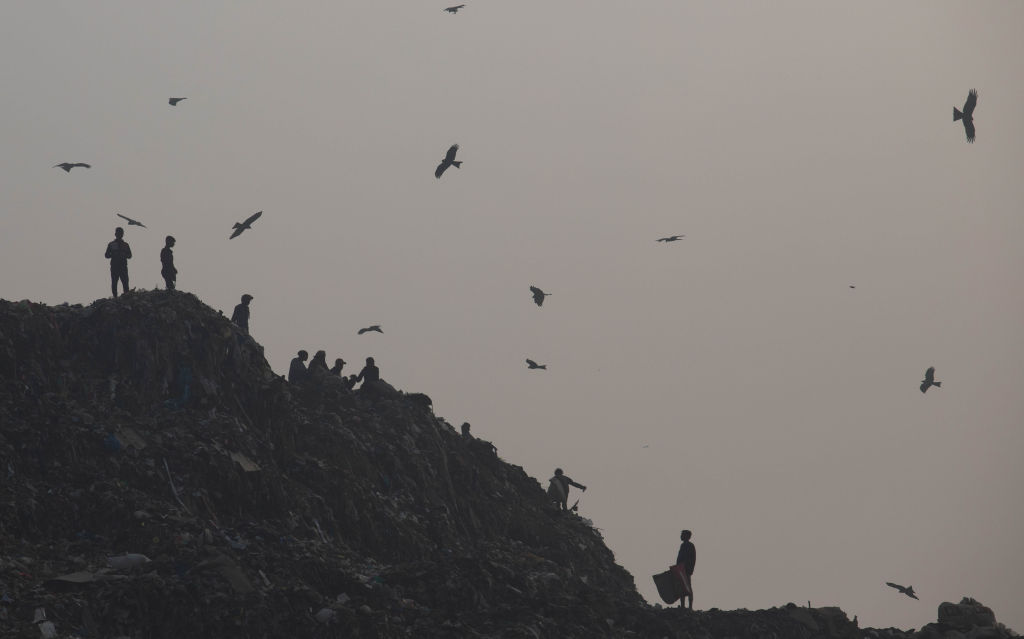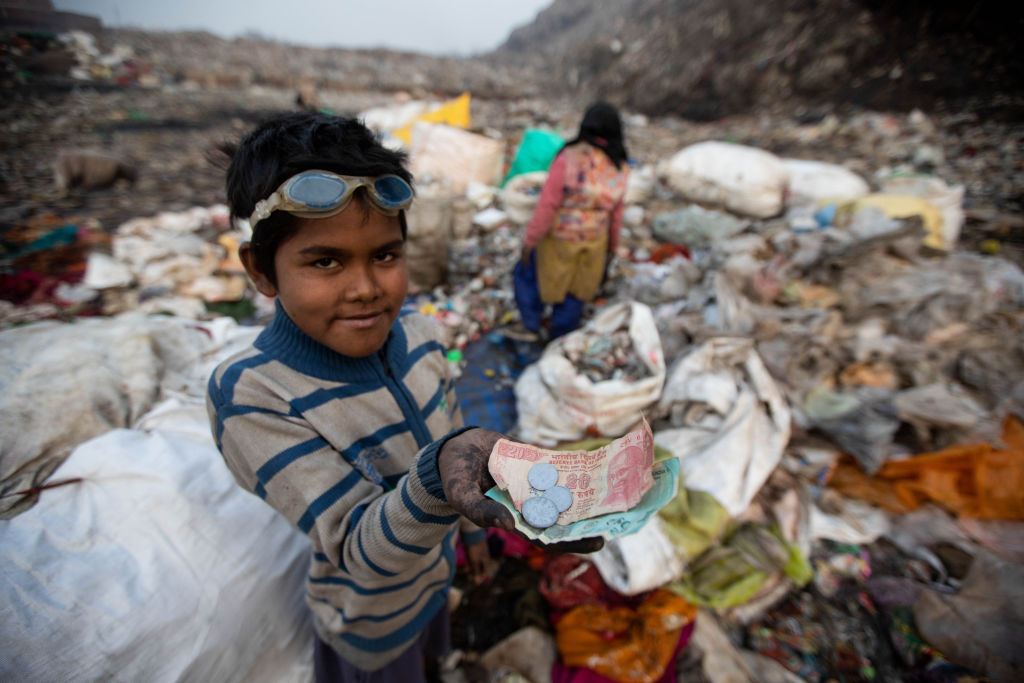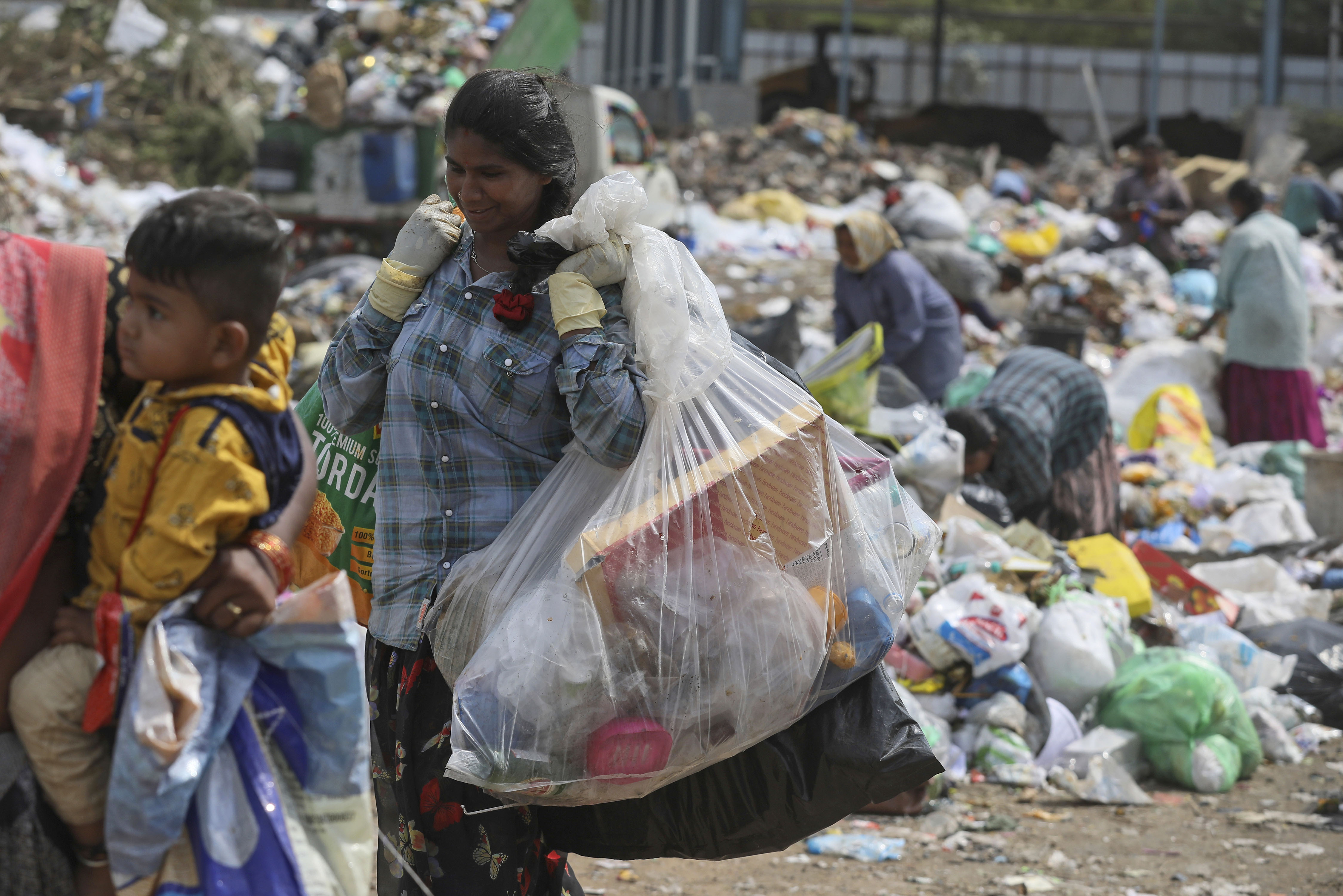broke out in New Delhi, and 15-year-old Alamgir Munna picks upthela(cart) and goes out. Because of that.
A young rug picker is a school-aged, plastic and metal scrap for sale at the Okra landfill, one of three huge garbage dumps in the vast Indian capital. Sift from a pile of garbage. It produces about10,000 tons of garbageevery day. Munna is one of Delhi's estimated150,000 rug pickers and works in three garbage mountains in thecountry. One of them isas tall as the Taj Mahalthey are brave because they are not officially recognized as sanitary workers. Methaneand other deadly chemicalsrecycle about one-fifth of city waste from decomposition waste, wild dogs, illness, and rotting stinks. increase.
Munna earns about 500 rupees a day, or $ 7 coins, for his groundbreaking work. Sad apologies for livelihoods have disappeared as India plans to implement a ban on disposable plastics used in the manufacture of items such as earphones, lollipop sticks, polystyrene packets, plates, cups, spoons and packages from 1 July. I'm trying. Wraps, cigarette packs, stirrers, and other everyday items that are indispensable to our lives. According to the Ministry of Environment, Forest and Climate Change, the manufacture, import, storage, distribution, sale and use of these "impractical and littering" disposable plastic items are no longer permitted. Penalties include up to 5 years in prison, 100,000 rupees ($ 1,200) or both.

Ragpickers are recyclable in Delhi Looking for waste Landfill.
Vijay Pandey—Picture Alliance / Getty Images
Like many other immigrants cleaning the city's leftovers, Munna is Delhi I'm thinking of leaving and returning to his village. With the ban imminent and no alternative livelihood visible, he is preparing for an uncertain economic future, along with the remaining 5 million rug pickers in India, equivalent to Ireland's total population. For someone like him, lack of skills and education, social limits, and survival by law, economic uncertainty is a euphemism for poverty, hunger, and worse.
The outlook isn't much disastrous, but the country's 50,000 plastic manufacturing units, most of which are small businesses that employ about 400,000 people in total, and plastic for their products. For example, major beverage companies have been struggling to find replacements for plastic straws everywhere that accompany beverage products, and have asked the government to postpone the ban.
As India finally enters the fight against plastics, turmoil, panic and uncertainty are a global struggle to move away from plastic dependence, which is essential to achieving emission targets.Emphasizes the urgency to break the addiction that is destroying the planet, and expensive nations have to pay for it.
Read more:US plastic recycling rates are even worse than we expected
Double Few countries exemplify bind than India. The 2022 Environmental Performance Index report released by Yale University and Columbia University on June 5 listsIndia(in partnership with Nigeria) as the most environmentally sustainable country on the list of 180. We are ranking. India rejected the findings of the report, but according to government statistics, it accounts for one-third of the11 million tonnesofplastic wastethat flows into the sea each year. Occupy. National law requires that all plastic waste be separated and reused in projects such as paved roads, and that only a small portion of recyclable material be dumped in landfills. A pile of garbage like okra is another way of saying it. More than 40% of India'splastic wasteis not even collected, let alone isolated and recycled.
Some Indian states, such as Maharashtra and Karnataka, have tried to ban disposable plastics in the past, but those efforts were largely unsuccessful. It leaves many skeptics about new national attempts. But Venkatesh Dutta, a professor at the School of Global Environmental Sciences at Baba Saheb Bimurao Ambedkar University, said the federal government is now tackling the problem throughout the supply chain, unlike the previously attempted failure to ban plastic bags. It states that it is. From the ban on the manufacture and distribution of disposable plastics to the ban on their sale, possession and import.
If this national ban comes into effect on July 1, India will replace disposable plastic bags with thicker, more durable ones. This can reduce the overall plastic usage. Also, in the future, we will be one step closer to eliminating multi-layer plastics, the final frontier in the fight against non-recyclables. The government is tinkering with the idea of banning multi-layer plastics used in all types of consumer packaging, from ready-to-eat snacks to milk packets, an economy that could unleash such a move. It is suppressed by the confusion.
Read more:Reusable packages are the latest eco-friendly trend. But does that really make a difference?
It causes problems with the high goals set by the world. Among what the United Nations Environment Programcalls the most important environmental agreement since the 2015 Paris Agreement,signed the Conventionat the United Nations Conference on the Environment in March this year. End plastic pollution by developing an internationally binding treaty by 2024.
But such a transition is difficult even for the most advanced economies. Earlier this month,the United States announced plans to phase out the sale of disposable plastic products in national parks and other public landsuntil 2032. Ban, and much earlier, the challenge gets even bigger. However, Prime Minister Narendra Modi's government, which first announced a ban on disposable plastics in 2016, refused to be upset in the face of a chorus of appeals from industry groups to postpone the ban.

10 year old rug picker show New Delhi Money earned by selling recyclable items collected at the Bhalswa Garbage Dump.
Bejay Pandy / Picture Alliance by Getty Images
Sunitana Rein, director of the Center for Science and Environment in New Delhi, has one ban. But given the limited resources of the National Pollution Commission, the lack of public awareness, and the proper planning of the transition to recyclables, implementing it is a completely different matter.
"You can't just dictate these things," says Narain. “Government support for small industries in the transition process must be a priority.” Companies that recycle waste plastic into products such as tiles and furniture are competitive in the market due to high manufacturing costs. I often have a hard time. Environmentalists like Naline have sought government incentives to support such companies in their recycling businesses.
Recycling is a way to go, not a fine or ban
Globally, Kenya's 2017 ban on disposable plastic bags is a global ban on the manufacture or possession of plastics. I imposed one of the heaviest fines. Is often welcomed as one of the most successful steps to eliminate plastics. However, Leah Oyake-Ombis, director of African livelihood innovation at the University of Nairobi's Sustainable Environmental Consulting Group and a prominent critic of the ban, has another approach that emphasizes recycling and waste management over fines {118. } Is advocated. Ban. According to Oyake-Ombis, developing economies are more likely to benefit from this strategy thanks to the employment opportunities they can create within the recycling chain.
Government subsidies will be the key to creating jobs during the transition. But for now, the bigger problem is to keep working. Much of the loss is felt in India's vast informal economy, which employs more than 80% of workers such as Munna. "What if you don't have the plastic to sell?" Munna probably looks for a suggestion and asks.
In the formal sector, Indian consumer goods companies will generally suffer as a result of the ban, but SMEs will be disproportionately hit, Ashok Kumar Agarwal of the Indian Industry Association. The chairman says. This is because, unlike conglomerates, it cannot absorb future losses. "The government needs to provide subsidies for new machines and other incentives for the transition to alternatives," he says.
Currently, such support is not available and the supply of recyclable plastic alternatives needed to manufacture consumer packaged products is tight. It also keeps the plastic much cheaper than the alternatives available.

Ragpickers are re-launched at the garbage dump Collect available materials on June 4, 2022 in Hyderabad, India.
Mahesh Kumar—AP
In 2016, the same year that the Indian government announced a ban on plastics, Hemant Rohra was full-time. Carry bag using more biodegradable polypropylene (a basic element used in the manufacture of plastics) by working and taking great personal risk and adding calcium and other minerals Started a small business to manufacture.
He wanted the demand for biodegradable bags to increase over time. But that didn't happen because his bag cost six times as much as a regular plastic bag. He now wants a lower tax on his product. But more importantly, he says, the government needs to make sure that the ban is in place.
In India, ambitious laws are often lightly applied to the ground and there are loopholes. Similar expectations for this plastic ban are not misguided, given that industry groups are asking the government to extend the deadline or delay it even a few days before the law comes into force.
But the government is not willing to give in. We have control rooms and special executive teams nationwide. State border checkpoints are asked to look for prohibited items. The Minister of Environment, Forests and Climate ChangeBhupender Yadavsaid on June 28, "We gave manufacturers enough time to prepare for 11 months before the ban came into effect." Said.
Contact usLetters @ time. com


